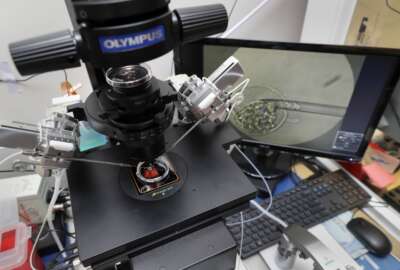Hubbard Radio Washington DC, LLC. All rights reserved. This website is not intended for users located within the European Economic Area.
Indepth with new NIH Director Monica Bertagnolli, M.D.
The National Institutes of Health welcomed its 17th director, Monica Bertagnolli. A set of different challenges comes with operating the health research wing.
Back in November of last year, the National Institutes of Health welcomed its 17th director, Dr. Monica Bertagnolli. Operating the government’s health research wing in a post-pandemic environment comes with a set of different challenges than what her predecessors dealt with. Federal News Network’s Eric White had this opportunity for an in-depth discussion on the Federal Drive with Tom Temin about Bertagnolli’s first six months on the job.
Interview Transcript
Eric White Back in November of last year, the National Institutes of Health welcomed its 17th director, Monica Bertinelli. Operating the government’s health research wing in a post-pandemic environment comes with a set of different challenges than what her predecessors dealt with. I recently got the chance to speak with her about that and what she’s learned so far. Just six months on the job. You’ve been on the job now for just over seven months or so, or coming up on the seven month anniversary. Any observations so far or lessons learned right off the bat? Just in these first few months?
Monica Bertagnolli Well, I think there’s two things that I can say. First of all, what has been wonderful is just that camaraderie and willingness across all the different 27 institutes and centers of the NIH who all have their own amazing leaders of me in this position seeing such camaraderie and willingness to work together and track record of working together across all those different leaders, that’s, I think, truly exceptional and illustrates a great commitment toward really doing whatever it takes to improve health for people. I had heard before I arrived in this position that to watch out for silos. And I’m really pleased today that while we still have silos and we have a tremendous willingness from everyone to eliminate those and work together as never before, which has been really wonderful. The other thing I will say that is a surprise to me, but a really wonderful one, is the willingness of the other heads of agencies across [Department of Health and Human Services (HHS)] to also work together. The understanding that NIH represents the main research arm of the effort, but we have so much to gain from working with partners across all of HHS. And we’re now getting ready to do some, I think, really transformative work together. And that’s also been great.
Eric White Yeah, coming from the National Cancer Institute. Were there any assumptions that you had about the role that maybe turned out to not be true or vice versa? Was there something that you didn’t quite see? You were from a pretty high view before, but now you’re even higher view about the agency itself.
Monica Bertagnolli I think that’s the main one I’ve already described, at NCI, and I was only there for a year. I was just barely getting my feet wet. At NCI it was intensely focused on that institute itself and all of its workings and really trying to optimize all the functions of NCI and really hadn’t yet lifted my head to think at what was possible across the broader scope of NIH. So I think that’s the major difference. The director really needs to think about every corner of NIH and the relationship of NIH to all of the other external parties. So it is a completely different job, frankly.
Eric White Yeah. Let’s get into the role of NIH. You had mentioned that you’re the research effort of the HHS mission, but do you see an evolving role of the National Institute of Health, especially in, let’s say, in a post-Covid world?
Monica Bertagnolli We always have an involving role. Ok. We have two aspects to what we do. First, we understand that at NIH our work has to encompass the research laboratory. It has to encompass the clinic. And it cannot stop at the door to the doctor’s office. It also has to fully encompass all of the communities that we serve. And those communities include rural sites in America, they include busy metropolitan areas, and they also include the rest of the world where lessons in health are critical. And so we constantly have to maintain an infrastructure that can serve that really, really broad environment. And then also, as COVID illustrated, be able, when needed, to be in reactive mode, because we can’t always anticipate what new threats are going to arise. And I’ll say that evolving all of biomedical research evolves constantly, but our focus is on maintaining that infrastructure so that we make progress all the time, so that we also are ready to jump in whenever we need to react to a new threat.
Eric White Can we get a little specific there? What changes have you seen across the agency? And maybe in just the national health strategy overall, coming out of still being able to smell the fires of the COVID pandemic.
Monica Bertagnolli Well, I’ll just raise a couple because there are so many. But let me give you the ones that I think are the highlights. Number one, the fragility of so many communities within the United States, in particular, the disproportional impact on some communities that are experiencing health disparities of that virus. That one just reminds us every single day that we have to overcome those disparities. So it highlighted that as never before. Again, something that we had been targeting, but it just made it so much more real to everyone to see how hard hit those communities were. Number two, the trust issue that was uncovered by the COVID 19 pandemic. Someone will say that the current environment created this trust issue. I think the trust issue must have been there even before, and perhaps the COVID pandemic really highlighted it. I think this has taught us in the biomedical research community that we can’t just put out our knowledge, put out what we’ve learned and expect everyone just to take it in and act upon it. We have to earn the trust of communities that lack it. And this again, drives us to be better listeners and better partners to communities of need out there who are really are experiencing disproportionate effects to health challenges. And I think has redoubled our dedication to listening to people and delivering what they need, not just assuming that our research is going to speak for itself, and that is taking us in a new direction that I think is very powerful.
Eric White As the research wing of the government’s health program, it almost seemed as if during the pandemic, just the process of health research just came under intense scrutiny. Everybody was learning kind of on the go. Has NIH taken any steps towards maybe improving that trust or in the actual process itself and saying, hey we’re researching here, we’re not necessarily going to have all the right answers right away. It was that sort of the seed of some of the issues that you saw.
Monica Bertagnolli No, I would take that in a little bit different direction and say that research means that people out there, all the people in the communities we serve, have to be part of the answers. We can’t produce answers that say, here’s what you need to do to stay healthy unless we have people out there who are our partners in being able to deliver those answers, that’s number one. And then number two, and this is the one that I think I have taken most to heart, is that the people who were in communities of disparity, the people who have had the least trust in the results of research, were the ones who were left out of research. So if we’re going to get those answers, we have to convince people that everyone needs to be part of helping us find those answers.
Eric White And on the note of inclusivity, you are the second woman to ever run the NIH. What can you speak about the rise in female leadership that you’re seeing, particularly in the medical field?
Monica Bertagnolli I think it’s really exciting, and I think it is the result of decades, decades of sustained progress in eliminating unconscious bias and ensuring that the best minds and those with the best passion are able to assume leadership jobs, and that there shouldn’t be kind of these inappropriate, let’s say, roadblocks to people getting there. And I think we’re seeing that for women, we’re seeing that for many other aspects of our communities. You hear us talk a lot about also promoting inclusion of various other perspectives in biomedical research and in leadership. And I think the need, again, to get deeply into the communities we serve are another aspect of that. Not only am I a woman, I’m somebody who grew up in a very remote, rural community, and that’s just another segment of our society example of someone whose voice I think we need if we’re going to conquer problems for everybody.
Eric White Gotcha. And can you speak to any particular advancements so far that you are proud of or, I know you’ve only been at it for seven months, so the list of accomplishments may not be as long as one might hope, or anything that you are working towards that you are really trying to take an interest in and have a driver seat role in.
Monica Bertagnolli So one of them is it comes from being a doctor in a clinic, also being a researcher then of a spectrum of research, but also being a doctor in the clinic and sitting there thinking, I know what kind of data and data quality I need if I’m going to publish a new manuscript. And I also sat in clinic and realized, look at the data quality that I’m using to make life altering decisions with my patients day in and day out. And let me tell you, the data quality doctors and patients are using in the clinic is not where we would like it to be. Because these decisions have incredible implications for people, far more then, frankly, than me publishing a paper. So I have been committed for a long time in really improving our ability to deliver data that is of a very high quality and can really be much better at letting our doctors and patients make critical decisions in clinic every day. And so those are some of the things that we’ve launched already. And these data have to come from all aspects of biomedical research, from the laboratory all the way to the communities. So we have a number of initiatives that we’ve already launched, making sure that we gather more data from the clinical care environment. We work not only in NIH, but across all of HHS to do so. And that also we integrate this with what’s coming out of our laboratories in a way that lets us return real results to our patients and our care providers.
Eric White Did you happen to speak with any of your, well, I’m sure you have. But your predecessors, did they have any advice for you? We spoke to Dr. Francis Collins a lot on this very program, about some of these issues as well. What were some of the tips and tricks that they had left behind for you?
Monica Bertagnolli Oh, I was so fortunate that my predecessors have been incredibly generous. Dr. Elias Zerhouni, Dr. Harold Varmus, and certainly Francis Collins have been not only given me incredible support as I entered the position, but still are constant advisors to me. Each of them brings a different and very powerful lens to this job, and so they have been incredibly helpful, supportive, and they are constant advisors still.
Eric White It really is kind of a grab bag as far as NIH directors go, as far as where their area of expertise is. And the position they held before usually running one of the institutes themselves. Does that speak to the NIH’s kind of collaboration that you had spoken about earlier, and the diversity of fields really coming together, and why it makes the agency so unique?
Monica Bertagnolli Oh, absolutely. No individual can come into this job with everything that you need to be able to address the depth and breadth of what NIH needs to tackle. And I thineach of us were chosen for a particular qualities at the time. That might be some of the most emergent issues. But each of us also needs what the others have already brought in. So I agree, I think I have the benefit of being the NIH director, who has actually a total of many NIH directors being able to help with the job.
Eric White This may be the hardest question to ask you because it’s self analysis. Why do you think you were chosen?
Monica Bertagnolli I think it was because we find a time when it is very helpful to have somebody with a strong scientific background, but who’s also been a doctor in the clinic, seeing patients every day up until the time I came on as NCI director, and bringing the perspective of the doctor in the clinic.
Eric White Finishing up, I have to pick your doctor brain. How good are blueberries for my digestive system? Because I had a lot of them this morning and I want to feel good about myself.
Monica Bertagnolli I have no idea. I will say that in my previous experience in looking for better ways to improve diet, blueberries do have some wonderful antioxidants. Which, if we take them out of blueberries and concentrate them and use them in our model systems, they’re very helpful for preventing cancer and inflammation. And what that means when you actually eat blueberries, I’m afraid I don’t know.
Copyright © 2024 Federal News Network. All rights reserved. This website is not intended for users located within the European Economic Area.
Eric White
Eric White is news anchor and Federal Drive producer at Federal News Network.
Follow @FEDERALNEWSCAST





